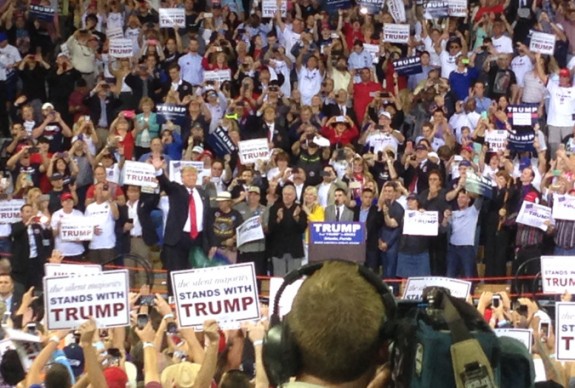
The headline practically writes itself. Governor Bobby Jindal’s endorsement of Marco Rubio had little noticeable impact, as the junior U.S. Senator from Florida came in a distant third in his state, while the “Duck Dynasty” Robertson family support of Donald Trump was a true reality TV victory for Donald Trump’s presidential campaign in Louisiana in the March 5, 2016 primary contest.
Self-described Democratic socialist, U.S. Senator Bernie Sanders (I-VT), took Nebraska and Kansas, with former Secretary of State Hillary Clinton winning in LA.
Trump and Senator Ted Cruz split victories on March 5th, with Cruz winning caucuses in Kansas and Maine, and Trump winning Louisiana and Kentucky, scoring an edge in the states with the larger delegate counts.
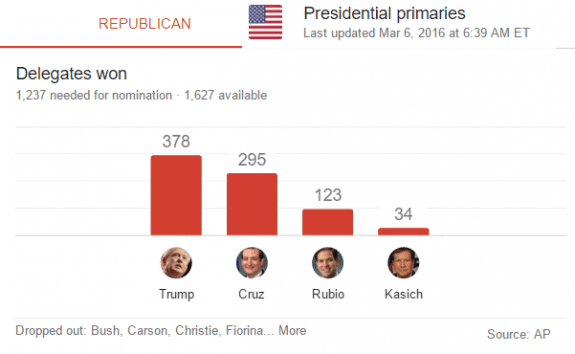
The other headline for March 5th voting ought to be that none of the so-called establishment candidates have won a race on the Republican side. Rubio became the default go-to person once establishment favorite, Jeb Bush, bowed out after his resounding defeat in South Carolina.
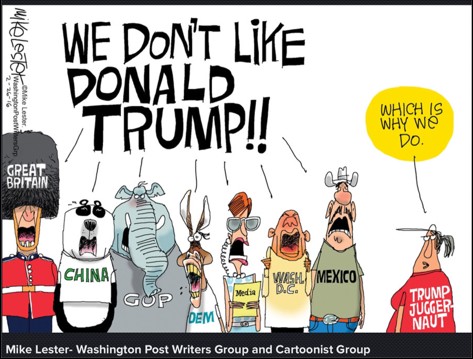
The once-vaunted 100+ million dollar war chest of the Bush campaign and the pro-Bush super PACs failed to dent The Donald’s populist/nationalist and self-described “common sense conservatism” movement. Some argue that attacks on Trump have actually helped him with voters angry at the establishment and the political status quo. Anti-Trump super PACs have pledged to spend up to $40 million in negative TV ads, hoping to derail the candidate’s momentum with voters.
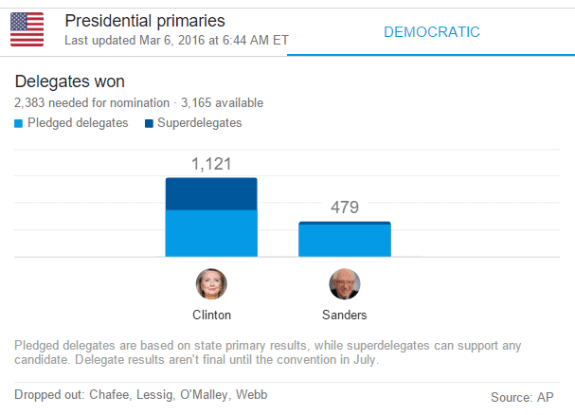
Rubio – who came to Washington, DC as a Tea Party candidate – has won in Minnesota and is expected to do well in Puerto Rico; but polling and the upcoming map for his campaign looks grim.
If it’s a tough road for Rubio, the path for under-funded Ohio Governor John Kasich is even more problematic. Each must win their home states on March 15, but each faces stiff challenges in their own turfs and beyond.
An emboldened Ted Cruz campaign narrative not only continues to declare that his is the only campaign that has been able to consistently upend Trump, Cruz is essentially forcing a showdown with the real estate titan by opening ten well placed campaign offices in FL.
Anti-Trump talk radio show host, Erick Erickson, called Saturday morning for Rubio to join Ted Cruz’s campaign as his VP, as yet another attempt to derail Donald Trump’s otherwise apparent path to the Republican party nomination.
A Drudge Report headline says that Trump has called on Rubio to bow out. Trump has brushed off Rubio’s recent attacks – which were essentially repeated and underscored by 2012 Republican nominee Mitt Romney – as having the same impact as that of others, like former Governor Jeb Bush who tried it before. Trump called Romney a “failed candidate” who blew an election he should have won against the “failed presidency“ of Barack Obama.

Voter turnout for Democratic candidates has been down so far in 2016 vs. the 2008 election cycle. By contrast, the energy created on the hotly contested Republican side has seen record voting, with increases of 50% and more in various states to date. In Massachusetts, reports say that some 20,000 Democrats left their party to vote in the Republican primary.
Those facts have bolstered the Trump campaign claims that it has brought in Democrats and Independents, and could in a general election, win in states such as deep blue New York or New Jersey, as well as swing states such as Florida, Ohio, Virginia or Pennsylvania. Trump says that Hillary’s campaign fears running against him. Indeed, Clinton has mentioned Trump directly or by inference, while generally ignoring other Republican candidates.
The Campaign and the MH Industry
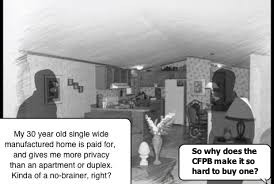
Rubio has supported the manufactured housing industry’s reforms sought in the Preserving Access to Manufactured Housing Act, S 682. The Washington Post quotes Ted Cruz as saying, “Five major agencies that I would eliminate: the IRS, the Department of Commerce, the Department of Energy, the Department of Commerce and HUD.” Cruz has suggested the functions of those agencies could be sent back to states or to other federal departments, which leaves manufactured housing industry members wondering – would the HUD Code manufactured home program functions be transferred to, say, the Department of the Interior?
Democratic candidates have favored no changes on Dodd-Frank that might help affordable housing. HR 650 passed the House in the spring of 2015 with bi-partisan support, and the current state of the CFPB’s regulations harms the resale values of millions of lower cost manufactured home and conventional housing owners.
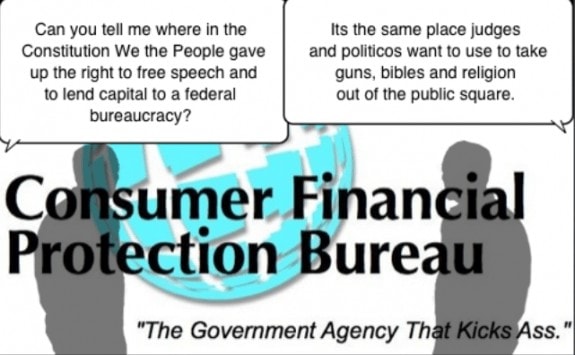
Donald Trump was quoted by The Hill as saying, “We have Dodd–Frank and we’re in a bubble right now anyway,” Trump has called Dodd-Frank “Terrible,” and along with other Republican candidates, has said he’d repeal the legislation that created the Consumer Financial Protection Bureau (CFPB).
While many questions remain on the specifics of what impact the policy positions of each of the campaigns might have on affordable housing in general, and manufactured housing in particular, there is little doubt that the Democratic front runner’s greatest primary challenge is the FBI and the DOJ, while the upcoming math and momentum strongly favors Donald Trump. ##
(Image credit sources are as noted by each image.)


























